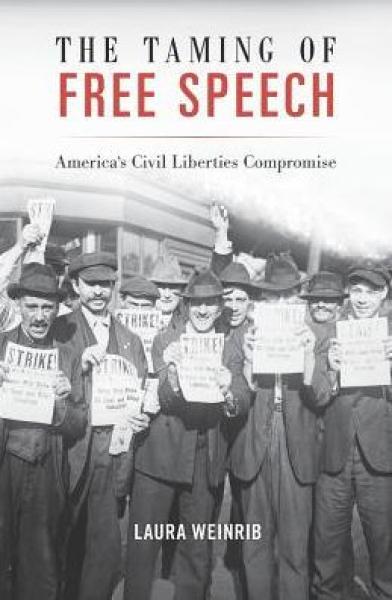Description
In the early decades of the twentieth century, business leaders condemned civil liberties as masks for subversive activity, while labor sympathizers denounced the courts as shills for industrial interests. But by the Second World War, prominent figures in both camps celebrated the judiciary for protecting freedom of speech. In this strikingly original history, Laura Weinrib illustrates how a surprising coalition of lawyers and activists made judicial enforcement of the Bill of Rights a defining feature of American democracy.
The Taming of Free Speech traces our understanding of civil liberties to conflict between 1910 and 1940 over workers' right to strike. As self-proclaimed partisans in the class war, the founders of the American Civil Liberties Union promoted a bold vision of free speech that encompassed unrestricted picketing and boycotts. Over time, however, they subdued their rhetoric to attract adherents and prevail in court. At the height of the New Deal, many liberals opposed the ACLU's litigation strategy, fearing it would legitimize a judiciary they deemed too friendly to corporations and too hostile to the administrative state. Conversely, conservatives eager to insulate industry from government regulation pivoted to embrace civil liberties, despite their radical roots. The resulting transformation in constitutional jurisprudence--often understood as a triumph for the Left--was in fact a calculated bargain.
America's civil liberties compromise saved the courts from New Deal attack and secured free speech for labor radicals and businesses alike. Ever since, competing groups have clashed in the arena of ideas, shielded by the First Amendment.
Laura Weinrib shows how a coalition of lawyers and activists made judicial enforcement of the Bill of Rights a defining feature of American democracy. Protection of civil liberties was a calculated bargain between liberals and conservatives to save the courts from New Deal attack and secure free speech for both labor radicals and businesses.
A fascinating retelling of First Amendment history.--Anders Walker"American Journal of Legal History" (09/01/2017)
In this well-written and thoroughly researched book, Weinrib explores the central role that the U.S. labor movement played in promoting civil liberties while advocating workers' rights and, sometimes, revolutionary change. Ultimately, Weinrib shows how labor's alliance with the ACLU helped to establish a new battleground in which labor eventually was destined to lose.-- (04/01/2018)
Joins the select ranks of must reads for those interested in the history of American civil liberties...A deeply considered, smartly presented, genuinely insightful analysis of the evolution of the early civil liberties movement.--Robert C. Cottrell"North Carolina Historical Review" (10/01/2017)
Provides a fascinating look at the social, intellectual, and economic forces at work in the early 20th century, shaping the relationship of the economic classes to each other and to the government and resulting in the modern understanding of civil liberties.--Victor Baltera"Massachusetts Law Review" (12/01/2018)
Provocative in its assessment of what the consequences of the 'taming of free speech' have been.--Donna T. Haverty-Stacke"Law and History Review" (11/01/2017)
This excellent book chronicles the shift in the American Civil Liberties Union's conception of free speech from a natural right of labor to 'agitate' against capital through coercive tactics like aggressive picketing and strikes, to a 'tamer, ' value-neutral vision of free speech... Thoughtful and informative.--Burt Neuborne"The Historian" (12/01/2018)
Utterly brilliant...Balanced and restrained in her writing but original and subversive in her argument, Weinrib stops short of offering morals from this history...Most important, Weinrib reanimates a strange time when the forces of business and the forces of labor were engaged in a pitched battle about the way Americans should construct their economy. When you go looking for the origins of civil libertarianism, it turns out, you find a class struggle...Weinrib's book is an extraordinary reminder of why history matters to the present.-- (09/25/2016)
Extremely original and well-written...[A] wide-ranging history.--David M. Rabban"Reviews in American History" (06/01/2017)
[An] important revisionist history of the origins of American civil liberties...Offer[s] important correctives to the celebratory accounts of civil liberties that we so often tell ourselves.--David Cole"New York Review of Books" (03/23/2017)
The Taming of Free Speech is...a complex story about the evolution of political and legal tactics within competing organizations and among the notable cast of characters at their helm... [A] provocative book.--Sophia Rosenfeld"Dissent" (10/01/2016)
A fascinating read, as constitutional history and as storytelling...The book highlights the underappreciated foundational role of the interwar ACLU.--D. E. Smith"Choice" (03/01/2017)
Weinrib's important reconstruction of the history of our notions of free expression shows how an idea first offered on behalf of labor radicals became transformed into a general account of why all dissent from the conventional should be protected. The Taming of Free Speech is a major contribution to the history of civil liberties.--Mark Tushnet, Harvard Law School
This is a big, bold project, a painting on a large canvas, depicting many different scenes in the manner of a Brueghel painting or WPA mural. It is a major work of history which will, I am quite sure, remain for many years the authoritative account of the ACLU's pivotal role in producing our modern law of free expression.--Robert W. Gordon, Stanford Law School
Product Details
- Harvard University Press Brand
- Jan 7, 2021 Pub Date:
- 0674545710 ISBN-10:
- 9780674545717 ISBN-13:
- 480 Pages
- 9.4 in * 6.4 in * 1.4 in Dimensions:
- 2 lb Weight:




